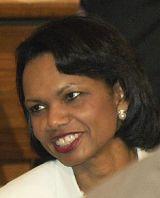Rice welcomed at Darfur displaced persons camp
By ANNE GEARAN
ABU SHOUK, Sudan, July 21, 2005 (AP) — Children displaced by Darfur’s violence had a warm welcome Thursday for U.S. Secretary of State Condoleezza Rice, who had just pressed the Sudanese president on the humanitarian situation in the troubled western region.
 After a bumpy and dusty ride from the airport to the region’s second largest displaced persons camp, Rice was surrounded by children reaching for her hand and chanting: “Welcome, Welcome Condoleezza.”
After a bumpy and dusty ride from the airport to the region’s second largest displaced persons camp, Rice was surrounded by children reaching for her hand and chanting: “Welcome, Welcome Condoleezza.”
Rice said the United States would hold the Sudanese government to account if it fails to end the crisis.
In the area she toured, some of the 55,000 displaced villagers had tried to add cheer to the hot, sandy expanse by planting pink and magenta flowers outside the doorways of their plywood and canvass huts. Abu Shouk is the second-largest camp in the region.
Rice said that her hour and a half visiting the camp, meeting with humanitarian workers and women who described their fear of rape and violence by government forces, put the crisis in stark relief.
“I think people have known this is a devastating crisis for so many people and the United States has called it by name, that is that a genocide was committed here,” she said.
Earlier Thursday, Rice met in the capital with Sudanese President Omar el-Bashir.
“She was very direct about the skepticism of the international community about their ability to improve Darfur,” Rice senior adviser Jim Wilkinson said.
Rice put it this way: “I said action, not words.”
U.S. officials said Sudanese officials repeatedly asked Rice to lift international sanctions on Sudan, but that she gave them no promises.
But Rice later indicated she might consider requests to ease sanctions on railway and aircraft components.
“I think we have to look at the argument that this is an issue for humanitarian reasons,” Rice said in an interview with National Public Radio. “Obviously if there is a case on the humanitarian side we would be willing to look at it.”
The United States accuses el-Bashir’s government of recruiting and equipping militiamen to massacre villagers and burn homes in Darfur.
El-Bashir denies government involvement, but the United States and international organizations say his military sent helicopter gunships to bomb small villages before raiders swept in with horses, guns and knives.
While Rice was meeting with el-Bashir and other officials, Sudanese security forces manhandled aides and reporters accompanying her, angering Rice, who demanded an apology.
After landing near the Darfur displaced persons camp, U.S. State Department spokesman Sean McCormack said the Sudanese foreign minister had telephoned Rice aboard the plane to say he was sorry for what had happened in Khartoum.
War-induced hunger and disease have killed more than 180,000 people and driven more than 2 million from their homes. No reliable figures are available on the number of people directly killed in attacks, but it is believed to be even higher than the toll taken by hunger and disease.
Sudan formed a new reconciliation government this month, following a peace agreement to end a 21-year-year civil war between the Muslim north and the mainly Christian and animist south that killed an estimated 2 million people.
That conflict was separate from the Darfur killing, which began after ethnic African tribes took up arms in February 2003, complaining of discrimination and oppression by Sudan’s Arab-dominated government. The Sudanese government then allegedly responded by backing a counterinsurgency by Arab militia known as the Janjaweed.
El-Bashir remains in charge of the new government with former southern rebel leader John Garang installed as a new vice president.
The United States has held the Arab-dominated former government at arm’s length, operating an embassy without a full ambassador and listing Sudan, Africa’s largest country, among the nations sponsoring terrorism.
Still, the U.S. administration has made Sudan a focus of diplomatic and humanitarian efforts, with US$700 million (A?580.29 million) spent for humanitarian needs over the past two years. The United States also supplies logistical help for African Union troops newly installed as peacekeepers.
___
On the Net:
State Department: http://www.state.gov
